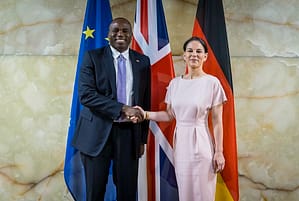According to Berenberg economist Kallum Pickering
The EU has spelled out the hard choices for the UK. If the UK insists on its ‘red lines’ for post-Brexit trade, the EU cannot offer terms that are better than those for its other non-EU political allies such as Canada. We believe that, under such non-preferential terms of access to the EU market, UK trend growth would decline from c2.1 per cent pre-Brexit to 1.5-1.6 per cent.
Yesterday EU Council president Donald Tusk presented his draft guidelines for future UK-EU trade based on the UK’s stated objectives for Brexit: to leave the customs union, the single market and the jurisdiction of EU institutions such as the European Court of Justice. On this basis, the EU can offer the UK a free trade agreement that covers all goods with a zero tariff but does not include financial services. This is similar to the EU’s free trade agreement with Canada. It is a far cry from the UK’s aims for future UK-EU trade set out last Friday by UK Prime Minister Theresa May. Her objectives included, but were not limited too, frictionless trade in goods and services, including financial services, and membership of certain EU agencies. We expect the EU council to accept Tusk’s draft at the EU summit on 22-23 March.
The key problem remains unanswered – the Irish question
Tusk’s draft guidelines do not spell out any specific solution to the Irish question, namely how to preserve the current no border arrangement between Northern Ireland and the Republic of Ireland. The draft guidelines simply state that any future agreement should address ‘appropriate customs cooperation, preserving the regulatory and jurisdictional autonomy of the parties and the integrity of the EU Customs Union.’
The UK has promised to uphold the Irish status quo and leave the EU customs union. This is a contradiction according to the EU, which has argued before that the border on the Irish Isle can only be kept open if either the entire UK or at least Northern Ireland de facto stay in the EU single market and customs union. The latter would jeopardise the integrity of the UK market and re-open politically charged questions about Northern Irish identity. We believe that the UK will avoid this outcome at almost all costs.




Leave a Comment